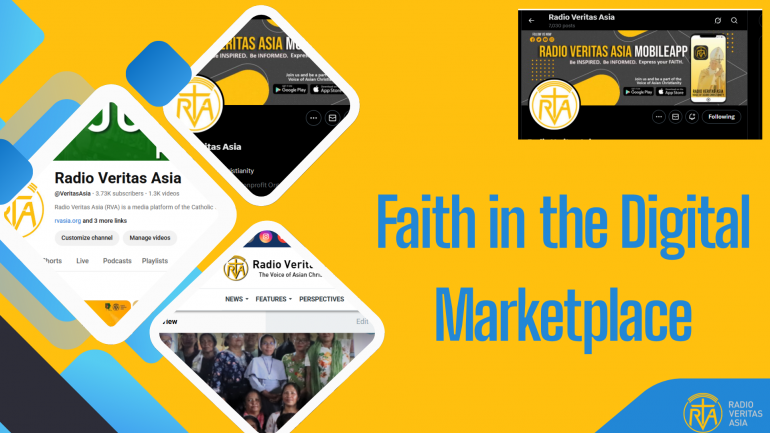Faith in the Digital Marketplace

The digital economy is not coming; it is here. We work, shop, learn, and even worship through screens. What started as convenient has become essential, reshaping how we live, spend, and relate to one another.
This shift brings both wonder and worry. A craftsperson in rural Guatemala can sell pottery to someone in Chicago. A parish can stream Mass to homebound members. Distance means less than it used to. But we have also become products ourselves. Our clicks are tracked, our preferences sold, and our attention harvested. We buy things we do not need with money we do not have, often without thinking twice.
For people of faith, especially Catholics, this reality demands careful thought. How do we engage with digital commerce without losing our souls in the process?
Those little black squares are everywhere now, on restaurant tables, church bulletins, and donation boxes. One scan and you are connected, purchasing, giving. It is seamless and efficient. Churches have embraced this tool for offerings and event registration. But something feels different about scanning a code to donate versus placing cash in a collection plate. The physical act of giving, reaching into your wallet, placing money in the basket, carried weight. It was deliberate, embodied, and real.
Digital giving is not wrong, but it changes the experience. Churches adopting these tools need to ask deeper questions: Are we making giving easier, or are we making it less meaningful?
Online shopping has removed almost every barrier between desire and purchase. Algorithms know what we want before we do. One-click buying means no pause, no reflection, and no second thoughts. This is not accidental. Apps are designed to reduce hesitation and reward impulse. Each purchase triggers a small hit of dopamine, creating a cycle that is hard to break. We shop when we are bored, sad, or celebrating, using consumption to fill emotional needs.
The result? Many people find themselves buying constantly yet feeling empty. We accumulate stuff but lose the ability to distinguish between want and need.
Crowdfunding platforms have democratized generosity. Within hours, strangers can rally around a cause, helping families in crisis, funding mission trips, and rebuilding churches after disasters. But this new landscape of giving has its own challenges. Campaigns with compelling stories and professional photos get more attention than those without. Need is not always what drives donations; presentation is.
For thoughtful givers, this means being more intentional. We need to look beyond emotional appeals to understand real needs. Charity should not become another form of consumption, driven by how a story makes us feel rather than genuine compassion.
The traditional Seven Deadly Sins have found new expressions in our digital age. Sloth appears when we choose online convenience over meaningful engagement. Gluttony manifests through food delivery apps that make overindulgence effortless. Greed hides behind investment apps and especially online gambling, which once required a trip to a casino, now happens on our phones.
Envy feeds off social media and influencer culture. We see curated lives and feel inadequate, leading to purchases meant to close the gap between their highlight reel and our reality. Lust finds its most destructive expression in easily accessible pornography, which damages our ability to form authentic relationships. Pride transforms every experience into content for others’ approval. Wrath spreads through anonymous comments and the ease of attacking others from behind a screen.
Living faithfully in the digital economy requires intentional choices. We need awareness of how technology shapes our desires and decisions. Not every app deserves our attention. Not every convenience serves our well-being. Moderation becomes crucial, taking breaks from screens, choosing real interaction over digital distraction, and buying what we need rather than what algorithms suggest.
Most importantly, we need people who use technology to spread light rather than noise. Our online presence should reflect our values, showing the same kindness, honesty, and restraint we would show in person.
The digital economy reflects who we are, our values, weaknesses, and hopes. For people of faith, the challenge is bringing our beliefs into our digital lives. Every purchase is a moral choice. Every click reveals something about our character. Every post shapes how others see the world.
Behind every screen is a soul. Behind every transaction is a person making decisions about what matters. The question is not whether to engage with digital commerce; we already have. The question is how to do it faithfully, remembering that our souls are more valuable than any convenience technology offers.








